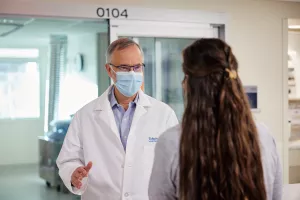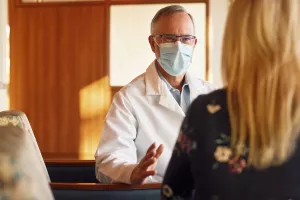We're here to treat your whole health, not simply one part. That's why our brightest minds in the field have come together to meet you where you are with your care needs, including our:
- Thoracic surgeons
- Medical and radiation oncologists
- Radiologists
- Medical and interventional pulmonologists
- Gastroenterologists
- Nutritionists
- Experts in pain management
- Palliative care experts
Treatment options are based on your specific condition and how far it has advanced. Your doctor will talk you through whether surgery, radiation therapy, chemotherapy or a combination of treatments will work best for you.
Surgery
Surgery is often the first step in treating thoracic cancers, especially if they're detected early on. Whenever possible, our experienced surgeons use minimally invasive techniques like video-assisted thoracoscopic surgery (VATS) to reduce your pain, risk and recovery time.
Sometimes, surgery is enough to eliminate the tumors. For more advanced cases, surgery is often followed by radiation and chemotherapy.
Radiosurgery + radiation therapy
People with early-stage lung cancer who aren't candidates for traditional surgery may be eligible for stereotactic body radiotherapy (SBRT). This non-invasive treatment uses large doses of hyper-targeted radiation to kill cancer cells while preserving healthy tissue.
Traditional radiation therapy combined with surgery is another approach to treating thoracic cancers.
Chemotherapy
Chemotherapy and other "targeted" cancer-fighting medications can be used alone or as part of a larger treatment plan with other therapies. It's often prescribed to reduce tumor size prior to a surgical resection (removing all or a portion of the lung) or to prevent tumors from returning after surgery.
Our doctors use advanced molecular profiling to determine if targeted anti-cancer drugs — which usually have fewer side effects than traditional chemotherapy — are right for you.


